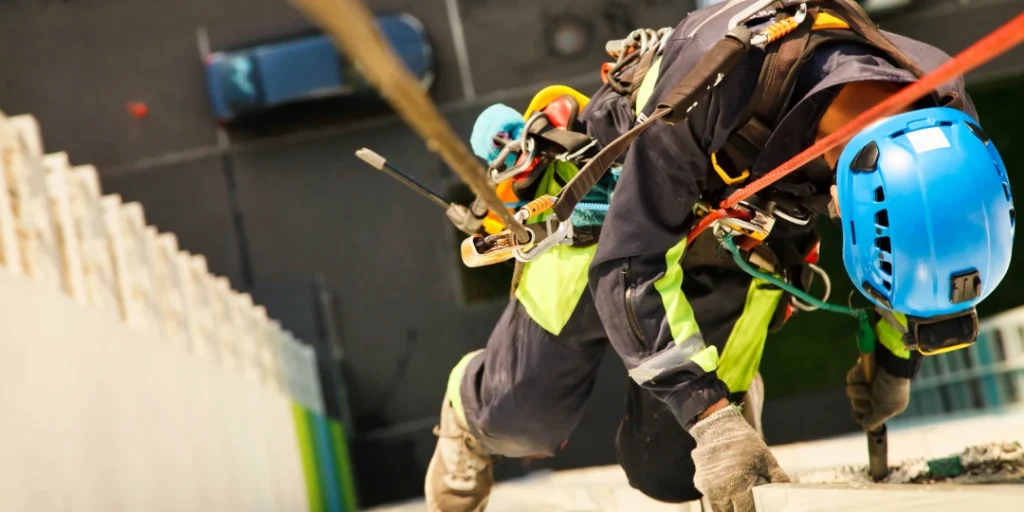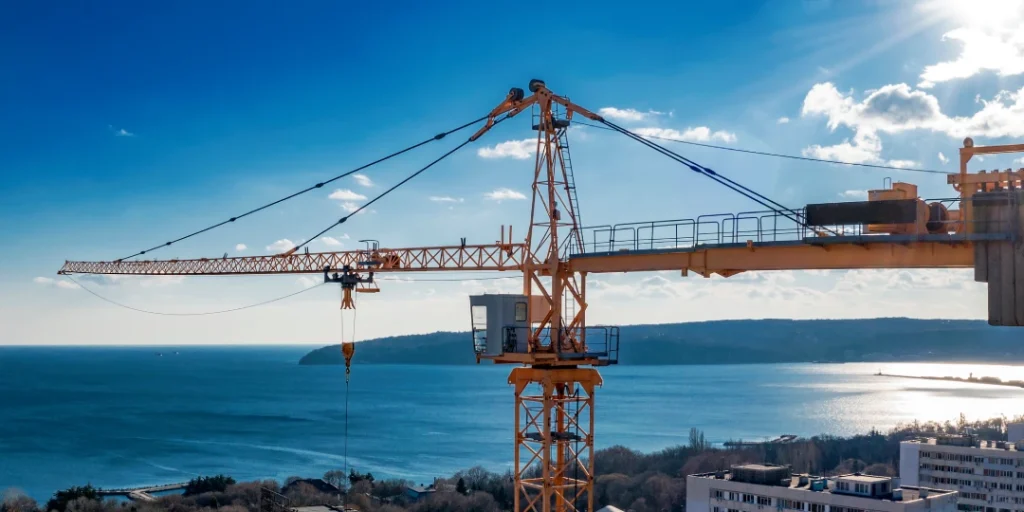Introduction: The Real Cost of Fall Hazards in Nashville
Falls don’t just drain profit margins; they destroy trust within your team and your standing in Nashville’s tight-knit construction community. A single fall incident can lead to skyrocketing workers’ compensation premiums, project delays, and OSHA fines that drain cash flow faster than an equipment breakdown. But the true cost isn’t only financial. Behind every fall is a family whose future can be permanently altered by a serious injury or fatality. Spouses become caregivers overnight, and children lose the security of a stable household.
Nashville’s construction landscape is booming, and with that growth comes the relentless pressure to complete projects faster to meet developer demands and rising client expectations. Tight schedules often translate to trades working side by side, ladders placed wherever space allows, and workers racing to finish framing, roofing, or mechanical installations before the next subcontractor arrives. Combined with Nashville’s humid climate, rain showers, and seasonal storms, rooftops, scaffolding planks, and metal decking can transform into treacherous slip zones in minutes. In these conditions, a single moment of inattention or an unsecured edge can be the difference between a productive day and a tragic event requiring emergency response.
Fall protection isn’t a checkbox on your site safety plan; it is the backbone of a sustainable, responsible construction operation. It demonstrates your commitment to your workforce, your clients, and your community. Contractors who treat fall protection as survival, not an inconvenience, are the ones who build a reputation for excellence and reliability in Nashville. By actively investing in fall hazard prevention, you are not only preserving your financial stability but also building a culture of accountability and care, which attracts top talent and ensures your business can weather the storms of market fluctuations and regulatory scrutiny.
Understand OSHA Standards Specific to Tennessee
Nashville contractors are governed by Tennessee OSHA (TOSHA), which enforces fall protection standards that align closely with federal OSHA while incorporating local oversight and nuances. Under these regulations, fall protection is mandatory for any work performed at six feet or higher in the construction industry. However, many contractors overlook the fine print that outlines specific requirements for different scenarios, such as scaffolding, ladders, and steel erection activities, each with its own set of criteria under Subpart M. For example, guardrail systems, personal fall arrest systems, and safety net systems have distinct guidelines regarding installation, inspection, and usage.
Understanding and implementing these standards should never be treated as a one-time exercise. Regulations evolve as TOSHA issues local interpretations, compliance memorandums, or clarifications following accidents or inspection trends in Tennessee. Contractors in Nashville need to commit to continuous learning, revisiting their safety protocols whenever new guidance is released. Relying on outdated interpretations can place your projects and your crew at risk. An investment in proper compliance isn’t just about avoiding fines; it directly impacts your workforce’s safety, your company’s ability to secure public and private contracts, and your eligibility for insurance programs that often require proof of a compliant safety program to offer competitive rates.
Ignorance isn’t innocence in the eyes of TOSHA. When an inspector steps onto your site following an incident or a random audit, the burden of proof is on you to demonstrate that your team understands and adheres to these regulations. Safety documentation, training records, and site-specific fall protection plans must be readily available and align with the requirements applicable to the work being performed. Failure to comply can result in citations, shutdowns, and even criminal charges in severe negligence cases. For Nashville contractors seeking to build a reputation for quality and responsibility, mastering the nuances of Tennessee’s fall protection standards is not optional.
Pre-Job Hazard Assessments Are Non-Negotiable
Pre-job hazard assessments are the frontline defense against preventable falls on Nashville construction sites. Before any worker steps onto a roof, scaffold, or elevated deck, site leaders must walk the area and identify risks that could cause slips, trips, and falls. This includes inspecting for unprotected edges, unstable surfaces, floor holes, and weather-related hazards that may change from hour to hour. A thorough hazard assessment should also identify nearby utilities, overhead obstructions, and equipment placement that could force workers into dangerous positions while performing their tasks. These findings should be documented, reviewed with the crew, and revisited daily to account for evolving site conditions.
A strong pre-job assessment goes beyond a simple checklist. It requires your team to critically think about the sequence of work, crew movements, and how trades will interact in shared spaces. For example, a roofing crew may be safe in the morning, but by afternoon, a plumber or HVAC technician could enter the workspace, introducing cords, tools, and materials that clutter walkways or cover skylights and floor holes. Weather shifts in Nashville, with sudden downpours or early morning dew, can instantly turn plywood decking or metal surfaces into slip hazards. Supervisors can adjust workflows, place warning lines, or reassign work to lower-risk tasks until surfaces dry or additional protection is installed.
Pre-job hazard assessments are not optional, nor are they tasks to delegate solely to junior team members. They require experienced eyes and a proactive mindset, ensuring fall protection controls are implemented before incidents occur. Effective assessments build a culture of accountability, empowering crew members to report new hazards and ensuring corrective measures are promptly applied. When supervisors take hazard assessments seriously, workers follow suit, creating a safer environment and reducing the potential for injuries, downtime, and costly fines. In Nashville’s competitive construction environment and maintaining operational continuity while demonstrating genuine commitment to safety.
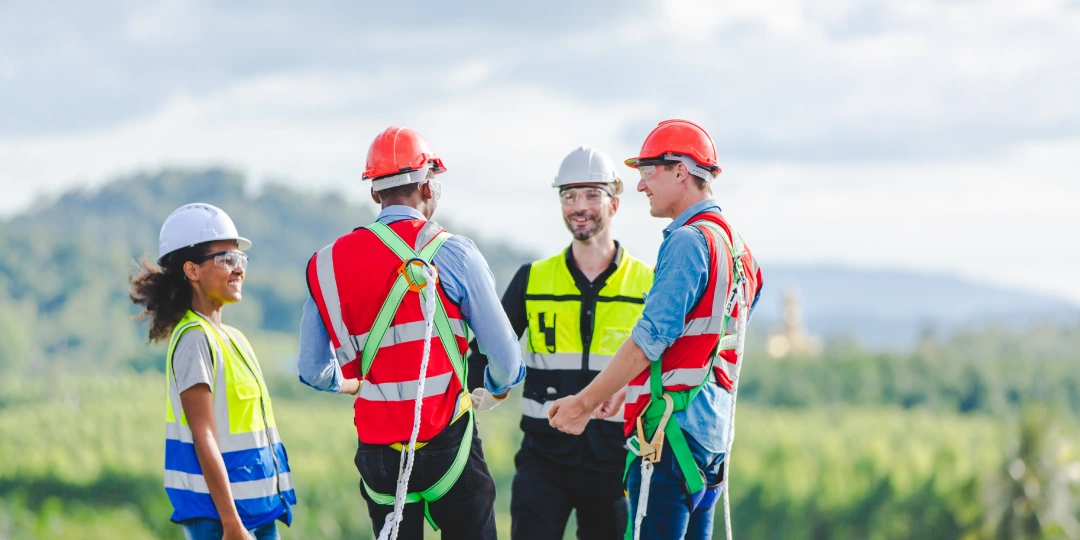
Proper Guardrail and Barrier Implementation
Guardrails and barriers are critical fall protection systems, not decorative edges. On Nashville job sites, contractors often face citations for incomplete or unstable guardrails that fail under pressure, putting workers at serious risk. A compliant guardrail system, a cornerstone of fall protection, requires a top rail at 42 inches, a midrail, and the strength to withstand at least 200 pounds of force, with toe boards often needed to prevent falling tools and debris.
Every component must be securely fastened, inspected before use, and maintained throughout the project. Using quality materials and ensuring correct installation is essential. Temporary systems require the same attention as permanent ones, with stable bases on level surfaces to prevent tipping. Nashville’s sudden weather shifts, including high winds and storms, can compromise guardrails, making routine inspections critical to maintaining effective fall protection.
Well-installed barriers and guardrails give workers confidence while working near edges, reducing hesitation and distractions that can lead to accidents. Contractors should train crews to recognize and maintain compliant guardrail systems, encouraging immediate reporting of issues. Prioritizing proper guardrail and barrier implementation strengthens fall protection efforts, safeguards teams, avoids costly disruptions, and builds trust with clients and inspectors on every Nashville site.
Harness Fit and Inspection Essentials
A harness is a critical fall protection tool, but it only protects workers if it fits properly and remains in good condition. A loose harness risks a worker slipping out during a fall, while an overly tight harness can restrict movement and discourage proper use. A correct fit requires snug straps, a centered D-ring between the shoulder blades, and secure, comfortable leg straps. Workers should be trained to don harnesses correctly every day, fastening all buckles and tucking straps to prevent snags that can compromise fall protection.
Daily inspections are essential to effective fall protection, even during busy mornings. Harnesses should be checked for frays, cuts, and worn webbing, while metal parts like buckles and D-rings must be inspected for rust, cracks, or other damage. Any harness showing signs of wear should be removed from service immediately and tagged for replacement. Documenting these inspections demonstrates compliance during audits or investigations and reinforces a contractor’s commitment to fall protection.
Nashville’s humidity and varying weather conditions can accelerate harness wear if stored improperly. Harnesses should be kept clean, dry, and away from chemicals and direct sunlight. Regular training on harness fit, use, and inspections builds a strong fall protection culture, protecting crews while strengthening trust and safety across every job site.
Controlled Access Zones: Who, When, and How
Controlled Access Zones (CAZs) are vital on Nashville job sites where traditional fall protection isn’t feasible. A CAZ is a clearly marked area, using flags or ropes, where specific work like leading-edge tasks occurs under controlled conditions. This prevents untrained personnel from entering hazardous areas and maintains site safety.
Only trained, authorized employees should enter a CAZ, understanding the hazards and safety procedures required. A competent person must oversee the zone, ensuring boundaries remain intact and that conditions such as weather or crew changes do not compromise safety during operations.
Improperly managed CAZs can quickly become high-risk zones if boundaries are unclear or if unauthorized workers enter. Contractors should document CAZ setup, authorized personnel, and work performed within the area. Regularly reviewing CAZ practices identifies gaps and strengthens protection. By treating CAZs seriously, Nashville contractors can maintain productivity while ensuring safety and compliance during high-risk tasks.
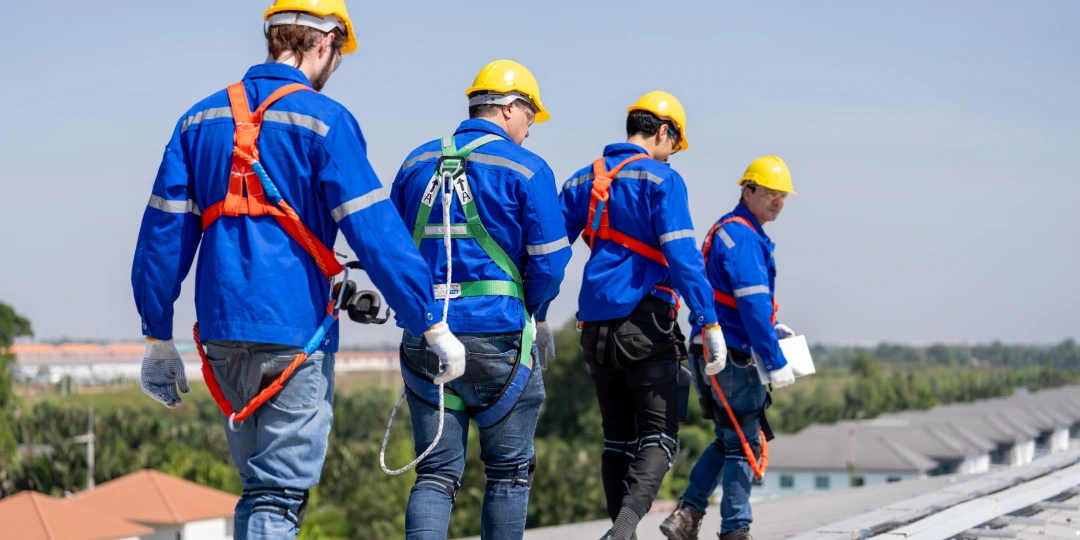
The Importance of Rescue Plans on Every Site
A rescue plan is a vital part of any fall protection program and can mean the difference between life and death. When a worker falls and is suspended in a harness, suspension trauma can develop within minutes, cutting off circulation and leading to unconsciousness or worse if the worker is not retrieved quickly. To support effective fall protection, every Nashville job site, regardless of size or project phase, needs a detailed, site-specific rescue plan aligned with the fall protection systems in use.
A strong rescue plan supports fall protection by outlining the equipment and methods required for a safe retrieval, assigning clear roles to crew members, and detailing immediate actions after a fall. This includes calling emergency services while initiating in-house rescue efforts without delay. Relying solely on external responders can lead to critical delays, especially in Nashville’s traffic or on remote sites where time is crucial for fall protection emergencies.
Rescue plans tied to fall protection should not sit ignored in a binder. They must be reviewed regularly and updated with changes in site conditions or crew composition. Practicing rescue drills under realistic conditions builds worker confidence and ensures quick, coordinated responses. Investing in practical rescue planning strengthens fall protection, protects your team, and demonstrates true safety leadership on every site.
Training Requirements Contractors Often Overlook
Training forms the backbone of fall protection, yet many sites overlook its depth. OSHA and TOSHA require employees exposed to fall hazards to receive training to recognize and reduce these risks. However, effective training goes beyond initial onboarding. Nashville contractors must ensure workers understand not just how to wear a harness but why these measures matter.
Training should cover using fall protection systems, recognizing hazards, inspecting equipment, and site-specific fall measures. Sessions must reflect real tasks and conditions, using hands-on demonstrations to drive understanding. Refresher training is essential when conditions change or new equipment arrives.
Documentation is critical. Records should note attendees, dates, content, and trainer names, protecting contractors during inspections while reinforcing safety culture. In Nashville’s competitive market, investing in practical, ongoing training builds a workforce that is safer, more confident, and efficient, reducing incidents while improving site performance and morale.
Recordkeeping and Compliance Audits in Nashville
Recordkeeping is more than paperwork; it protects your team and your business. Nashville contractors should maintain clear records of fall protection inspections, training, incident reports, and hazard assessments to demonstrate due diligence during TOSHA inspections or investigations.
Daily logs should capture checks of harnesses, lanyards, guardrails, and anchors, helping spot wear patterns and enabling timely replacement. Training records showing attendees and session details support OSHA compliance and show commitment to ongoing education. Hazard assessment documentation should note identified risks, actions taken, and responsible staff.
Regular compliance audits ensure that documented practices match site realities. Fall protection reviewing procedures and equipment help spot gaps and identify improvements. Engaging supervisors and workers in these reviews captures on-the-ground issues before they escalate. Prioritizing accurate recordkeeping and audits protects contractors legally while reinforcing a culture of accountability and safety, building trust with workers, clients, and regulators across Nashville sites.
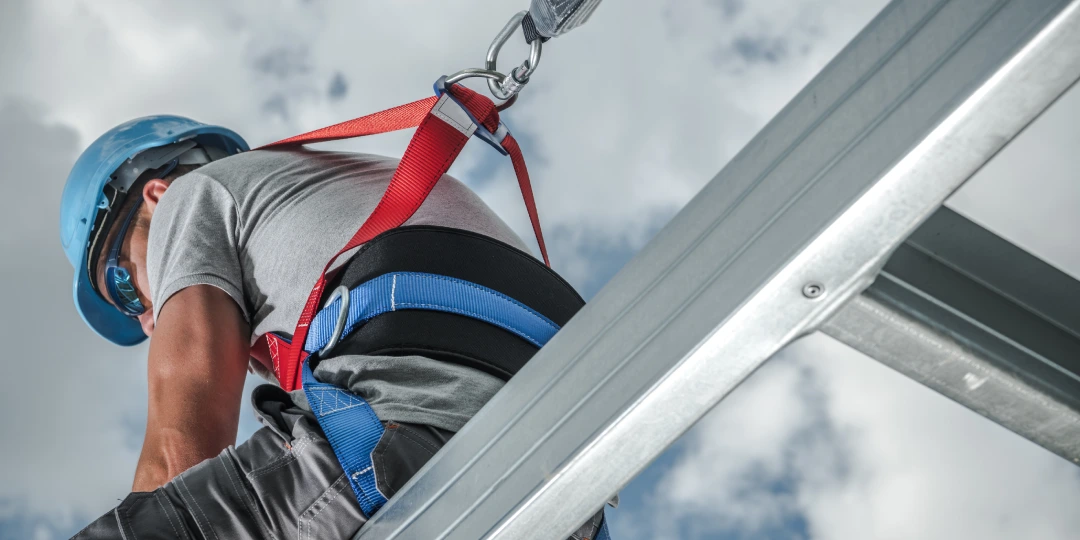
Frequently Asked Questions.
1.What is the minimum height for requiring fall protection on Nashville construction sites?
In Nashville, under TOSHA guidelines, fall protection is required for construction work at six feet or higher. This includes activities on scaffolds, ladders, roofs, and leading edges. Contractors should also be aware of specific requirements under Subpart M for different situations, ensuring guardrails, harness systems, or controlled access zones are in place to protect workers from falls and to remain compliant with Tennessee regulations.
2. How often should harnesses and guardrails be inspected on job sites?
Harnesses and guardrails should be inspected daily before use to check for wear, damage, or improper installation. Harnesses must be checked for frays, cuts, and functional buckles, while guardrails should be examined for stability, correct height, and secure attachment. After severe weather or site changes, re-inspect these systems to maintain safety and avoid citations.
3. Why is a rescue plan necessary for fall protection?
A rescue plan is critical because a fallen worker suspended in a harness can suffer suspension trauma within minutes. Having a clear, practiced rescue plan ensures workers can be retrieved quickly, reducing the risk of serious injury or death. Nashville contractors should maintain a site-specific rescue plan, train teams on procedures, and conduct regular drills to prepare for emergencies.
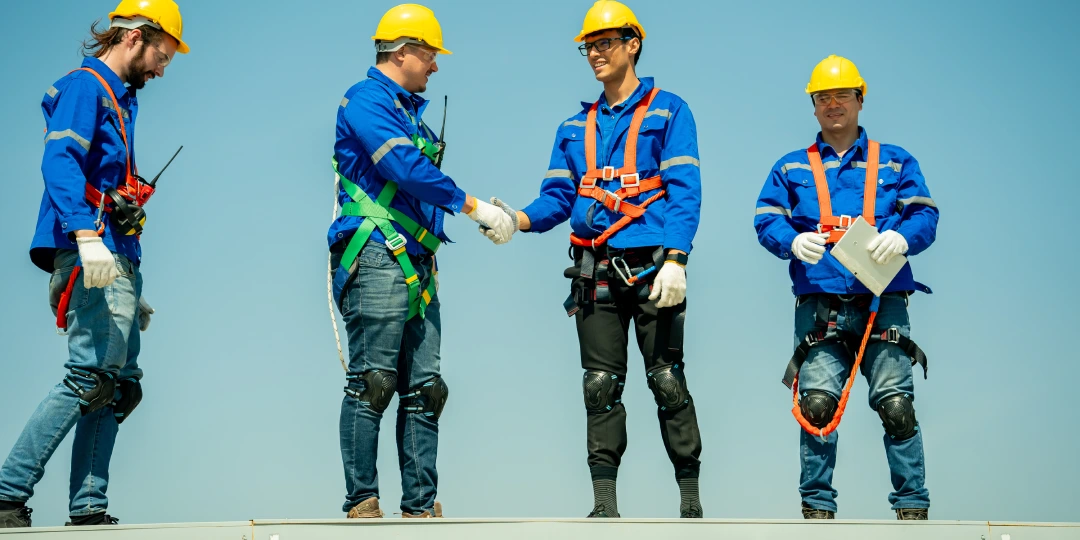
Conclusion: Building a Culture of Height Safety
Fall protection is not a box to check; it is the backbone of a safety culture that protects lives while keeping projects on track. In Nashville’s demanding construction environment, prioritizing fall protection demonstrates a contractor’s commitment to ethical business practices, the well-being of workers, and the ability to deliver projects without costly delays or liability issues.
Creating a culture of height safety goes beyond installing guardrails or issuing harnesses. It requires consistent training, thorough daily hazard assessments, and clear communication that keeps safety front of mind. Workers should feel empowered to report hazards and understand the role they play in maintaining a safe site. This not only prevents incidents but also builds a team culture grounded in accountability and care.
Ultimately, fall protection is stewardship of your team and your reputation. Contractors who make it a core operational principle build stronger, more confident crews and earn client trust, ensuring they remain competitive and respected in Nashville’s construction industry.


